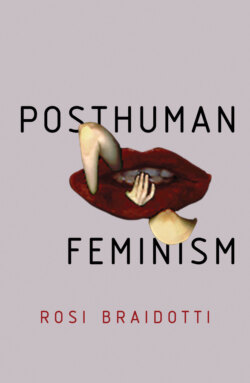Posthuman Feminism

Реклама. ООО «ЛитРес», ИНН: 7719571260.
Оглавление
Rosi Braidotti. Posthuman Feminism
Table of Contents
Guide
Pages
Dedication
Posthuman Feminism
Copyright Page
Acknowledgements
Introduction: Feminism by Any Other Name
A Posthuman Feminist Agenda
Notes
Chapter 1 Feminism Is Not (Only) a Humanism
The Man of Reason as the Image of Humanism
Disenchantment with the Humanist Figure of ‘Man’
Feminist Liberal Humanism: Gender Equality
Feminist Socialist Humanism: Class Equality
Feminist Black Humanism: Race Equality
Queer and Trans Inhumanism: Equality and Diversity
Conclusion
Notes
Chapter 2 The Critical Edge of Posthuman Feminism
The Contradictions of Neoliberalist Feminism. Political contradictions
Reproductive contradictions
Neo-socialist Feminism and the Mutations of Capitalism
The Transhumanist Delusion
Conclusion
Notes
Chapter 3 Decentring Anthropos: Ecofeminism Revisited
Is Culture to Nature as Man to Woman/Native/Others?
The Ecofeminist Critique of Anthropos
Feminist Critiques of Ecological Reason
From Animal Rights to Zoe
Against Environmental Racism
Post-secular Plateaus
Indigenous Critique of Anthropos
The Posthuman Acceleration
Conclusion: But ‘We’ Are in this Together
Notes
Chapter 4 New Materialism and Carnal Empiricism
The Materialist Turn
Bodily Materialism and Carnal Empiricism
Politics of Locations
Critical Feminist Spinozism
Symbiotic Matter
Elemental Feminist Materialism
Racialized Feminist Materialism
Heterogeneous Assemblages
Conclusion
Notes
Chapter 5 Technobodies: Gene- and Gender-editing
Posthuman Bodies Are Back with a Vengeance
Cyberfeminists and Other Bad Girls
Gaga Feminism
Critical De-naturalization: Feminist Technoscience Studies
Combining Re-naturalization and De-naturalization
Genealogy of Feminist Technoscience Studies
De-naturalization Re-naturalized: Dolly the Sheep
Naturalizing Queerness, Queering Nature
Disability Studies
Queer Kinship
Strategic Re-materialization of Technobodies
Placenta Politics
Conclusion
Notes
Chapter 6 Sexuality Beyond Gender: A Thousand Little Sexes
The Moth Shaking Its Wings in Me
Shimmering
Sexuality Is Not Gender
Beyond the Sex–Gender Distinction
The Principle of Not-One
Elemental Sexualities
A Genealogy of Transgression
Transversal Desires
The Positivity of Desire
Ethics of Eros
Conclusion
Notes
Chapter 7 Wanting Out!
Feminist Figurations in Scholarship
The Feminist Speculative Genre
Feminist Techno-utopianism
Afrofuturism and Black Posthumanism
Intergalactic Feminism
Notes
Epilogue: ‘Get a Life!’
References
Index
POLITY END USER LICENSE AGREEMENT
Отрывок из книги
For Anneke
I had the honour and pleasure of completing the research for this manuscript at the University of Cambridge, where I was invited as Diane Middlebrook and Carl Djerassi Visiting Professor in Gender Studies in the Autumn term 2019. My sincere thanks to Jude Browne, Lauren Wilcox and Holly Porter for their warm and collegial support during my stay. My heartfelt thanks to Joanna Bush for all her precious professional assistance. In the same period I was honoured to be a visiting fellow at St. John’s College, Cambridge. My sincere thanks to my sponsoring fellow, Ulinka Rublack for her friendly advice and mentorship, to the interim President of the College, Steve Edgley, and the deputy master Tim Whitmarsh for their warm welcome.
.....
In chapter 7, ‘Wanting Out!’, I address the creative, imaginative and speculative strands of posthuman feminism. Arguing for the importance of the radical imagination to the feminist posthuman project, I look at different examples of this specific style, ranging from figurative thinking in academic feminist scholarship, to science fiction, fantasy novels, utopian texts of a political or fantastic nature, through Afrofuturism and black space-travel narratives. The speculative genre voices the transversal alliance of sexualized, racialized, naturalized others against the dominion of Man/Anthropos. It combines dystopian and utopian elements in envisaging alternative feminist futures. The chapter ends with a feminist assessment of the economics and politics of the contemporary race for new materials in far-away regions and in outer space.
Finally, in the short Epilogue, ‘Get a Life’, I concentrate on the ethical implications of the feminist posthuman agenda in a world damaged by the tensions and contradictions of the posthuman convergence. I argue that the radical feminist imagination can be a source of inspiration for new scenarios of endurance and reconstruction. This is all the more relevant for a world haunted by a lethal pandemic and the need to reconstruct communities in highly divisive and painful times. An affirmative posthuman ethics entails the composition of communities sharing the same imaginings and values. It involves imagining a collective subject as the ‘we’ who are not one and the same, though we are in this posthuman predicament together.
.....